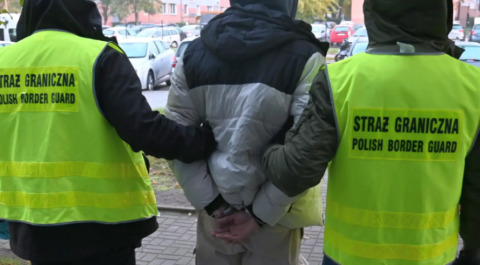Read Also
‘Migrants for sale’: An investigation into the clandestine migrant smuggling economy on the Mediterranean route – Part 1
Recruiting drivers
The investigators believe that most of the non-EU nationals acted as drivers for the gang, “as they typically charge less for their services than EU nationals.”
According to investigators, most of those arrested in Poland are suspected of being involved in recruiting these drivers in Poland. One example, Europol said, “involved a Russian citizen, who officially ran a car rental business in Poland, but was actually recruiting drivers and providing vehicles for transporting irregular migrants to countries throughout the EU.”
During the raids in Poland, phones, computer equipment and money was recovered | Photo: Europol press release
At least 600 migrants are believed to have been smuggled into the EU via this network. The migrants, states the press release, mostly originated from Afghanistan, Egypt, Iran, Iraq, Syria and Egypt.
Most of the migrants would fly themselves legally to Russia or Belarus. Once in Belarus, suspects of the smuggling network would transport the migrants to the Polish-Belarusian border, which they had to cross illegally.
Once over the border, the migrants are believed to have been picked up in Poland by other members of the network and driven to other EU countries, mainly Germany, by car.
Europol taskforce
Some migrants are believed to have paid for their journeys using cryptocurrency, stated Europol. As well as the fee for the overall journey, migrants were expected to pay an additional 500 euros to drivers picking them up in Poland and driving them to their final destination.
Over the last two years, national police forces and border guards have worked to try and crack down on smuggling activities along the Balkan route, and from Belarus via Lithuania, Latvia and Poland into Europe.
In response to this, in March 2024, Europol set up an operational taskforce, in collaboration with Austria, Czech Republic, Germany, Hungary, Lithuania, Poland, Slovakia and Ukraine. The taskforce helped facilitate an exchange of police information which, stated the press release, “revealed the dynamic operations of criminal networks active in the region.”
Read Also
Germany, France and Belgium conduct raids against suspected people smugglers
 Spanish police say they have arrested three suspects accused of smuggling migrants from Algeria to Europe | Photo: Spanish Interior Ministry press releaseSpanish police crack a suspected smuggling ring
Spanish police say they have arrested three suspects accused of smuggling migrants from Algeria to Europe | Photo: Spanish Interior Ministry press releaseSpanish police crack a suspected smuggling ring
Also on Thursday, police in Spain revealed they had broken up a network suspected of smuggling at least 70 Syrian and Algerian migrants into the country. They made three arrests.
According to reports, the migrants paid the smugglers up to 10,000 euros to be transported from Algeria to Spain on small fast boats. Some of the migrants then traveled from Spain on to other European countries, said police in a statement.
Spanish police added that the boats “lacked any safety measures,” reported Arab news, and no water or food was provided on the journey, thus posing a “serious risk” to migrants’ lives. Anyone who didn’t pay the full fees on time, was subject to violence, say police.
Once in Spain, police say that the migrants were kept in “dire” living conditions in the capital Madrid and also in the surrounding regions. They would then travel on to other parts of Spain, but most often Germany, say police.
Three arrests in Toledo area
Three people were arrested in the Toledo, suspected of being involved with the smuggling network, including the group’s leader, who was placed in detention, reports the French news agency Agence France Presse (AFP).
In a press release from the Spanish Interior Ministry, police said they also seized a “simulated assault rifle and a large machete.” Nine mobile phones, three luxury watches, a gold chain and various identity documents were also found during police searches of properties linked to the suspects.
The investigation into this gang, state Spanish police, began “as a result of a previous police operation, from which sufficient evidence was obtained of the existence of a network based in the provinces of Toledo and Madrid.”
Read Also
Spain: Three arrested for the deaths of five migrants
‘Parent cell’ based in Algeria
Police say the Spanish suspects were coordinated by a “parent cell” based in Algeria, and used fast boats to transport migrants to Europe. They tended to land on the coasts in the regions of Almeria and Murcia.
According to police, Syrian citizens smuggled via the route began their journey in Beirut airport in Lebanon. From there, they flew to Egypt, and would then travel to Libya, on to Tunisia, before finally arriving in Oran, Algeria.
Most of the crossings took place at night, say police, to avoid detection. Members of the gang are suspected of moving around Spain using falsified identity documents. Police say the suspected ringleader of the gang, is accused of having used up to seven different identities.
The three suspects arrested are charged with “belonging to a criminal group, promoting illegal immigration, falsifying documents ad violating road safety.”
With AFP
Source link : https://www.infomigrants.net/en/post/60799/two-suspected-smuggling-rings-cracked-across-europe
Author :
Publish date : 2024-10-25 11:26:00
Copyright for syndicated content belongs to the linked Source.


